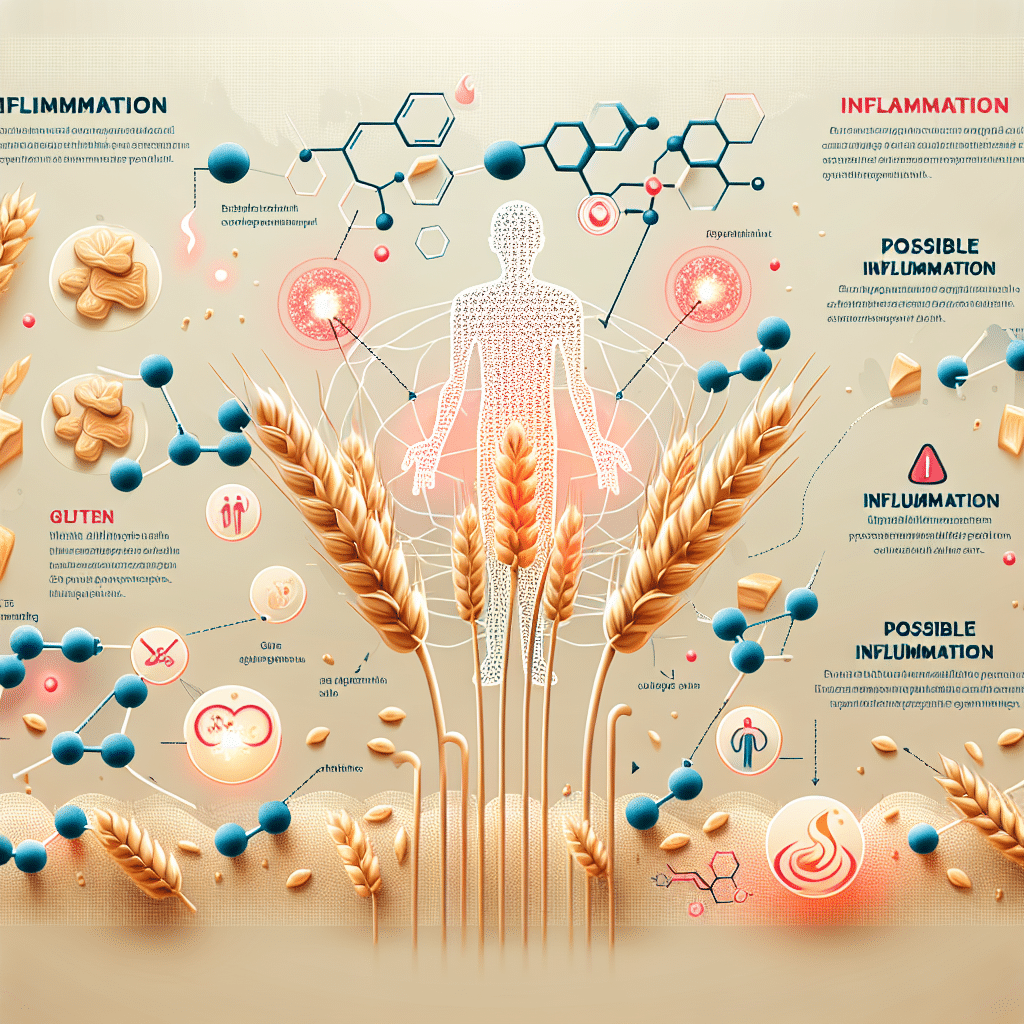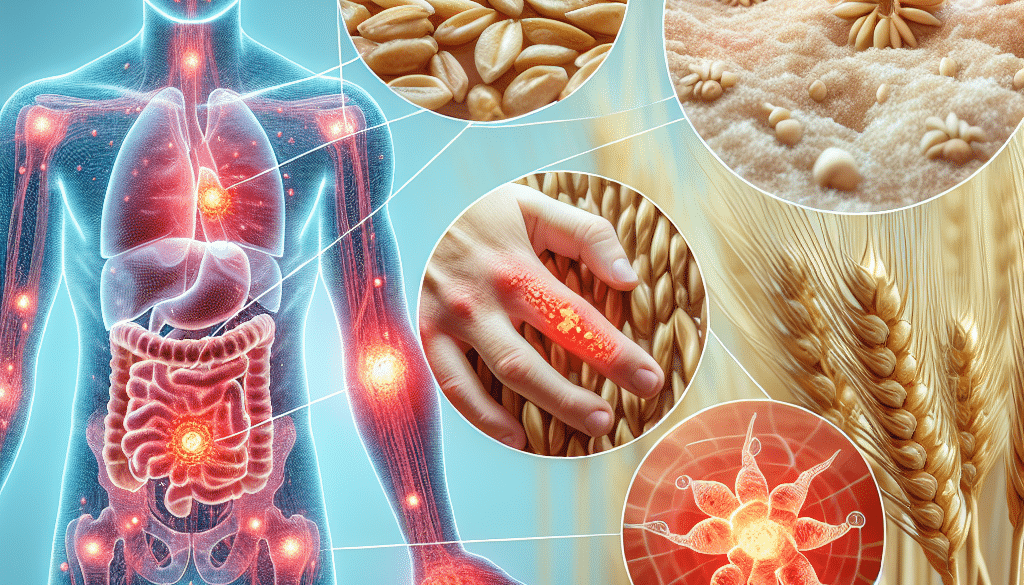What Is The Inflammatory Protein In Wheat?
-
Table of Contents
- Inflammatory Proteins in Wheat: Understanding the Impact on Health
- Understanding Wheat Proteins and Inflammation
- Gliadin: A Trigger for Immune Response
- Non-Celiac Gluten Sensitivity (NCGS)
- Wheat Allergy and Inflammation
- The Role of Amylase-Trypsin Inhibitors (ATIs)
- Case Studies and Statistics: The Impact of Wheat Proteins
- Strategies for Managing Wheat-Induced Inflammation
- Conclusion: Key Takeaways on Inflammatory Proteins in Wheat
- Discover ETprotein’s Range of Non-Wheat Protein Products
Inflammatory Proteins in Wheat: Understanding the Impact on Health

Wheat is a staple food for many cultures around the world, revered for its versatility and nutritional value. However, for some individuals, wheat can trigger inflammatory responses, leading to discomfort and health issues. This article delves into the inflammatory proteins found in wheat, their effects on the human body, and the scientific understanding of these components.
Understanding Wheat Proteins and Inflammation
Wheat contains a complex array of proteins, some of which can cause inflammation in certain individuals. The primary protein associated with inflammation in wheat is gluten. Gluten is a composite of two main proteins: gliadin and glutenin. While gluten is well-known for its role in celiac disease, it can also contribute to inflammation in non-celiac gluten sensitivity (NCGS) and wheat allergy.
Gliadin: A Trigger for Immune Response
Gliadin, a component of gluten, is often implicated in inflammatory reactions. In susceptible individuals, gliadin can lead to an immune response that causes inflammation in the gut and other parts of the body. This response is most severe in those with celiac disease, an autoimmune condition where the ingestion of gluten leads to damage in the small intestine.
Non-Celiac Gluten Sensitivity (NCGS)
NCGS is a condition in which individuals experience symptoms similar to those of celiac disease, but without the autoimmune intestinal damage. Symptoms can include bloating, abdominal pain, and systemic inflammation, and they improve when gluten is removed from the diet.
Wheat Allergy and Inflammation
Wheat allergy is an allergic reaction to proteins found in wheat, including but not limited to gluten. The body’s immune system mistakenly identifies these proteins as harmful, leading to the release of inflammatory chemicals like histamine.
The Role of Amylase-Trypsin Inhibitors (ATIs)
Recent research has identified another group of wheat proteins, known as amylase-trypsin inhibitors (ATIs), which may contribute to inflammation. ATIs can activate immune cells in the gut and other tissues, leading to inflammatory responses even in individuals without celiac disease or wheat allergy.
- ATIs and Gut Inflammation: ATIs can stimulate the innate immune system, potentially leading to gut inflammation and exacerbating conditions like irritable bowel syndrome (IBS).
- ATIs and Non-Gut Related Inflammation: ATIs may also play a role in systemic inflammation, affecting joints, skin, and other organs.
Case Studies and Statistics: The Impact of Wheat Proteins
Several studies have highlighted the prevalence and impact of wheat-related disorders. For instance, celiac disease affects approximately 1% of the population in the United States, while NCGS is estimated to affect up to 6%. Wheat allergy is less common, affecting less than 1% of children, with most outgrowing it by adulthood.
Case studies have shown that individuals with NCGS or wheat allergy who eliminate wheat from their diet often experience a significant reduction in inflammatory symptoms. This suggests a direct link between wheat proteins and inflammation in these populations.
Strategies for Managing Wheat-Induced Inflammation
For those affected by wheat-induced inflammation, several strategies can help manage symptoms:
- Gluten-Free Diet: Completely avoiding gluten-containing grains is essential for individuals with celiac disease and can benefit those with NCGS.
- Low-ATI Diet: Some may find relief by reducing their intake of ATIs, which are present in wheat and other grains.
- Medical Supervision: Consulting with healthcare professionals can help in diagnosing and managing wheat-related disorders.
Conclusion: Key Takeaways on Inflammatory Proteins in Wheat
In summary, the primary inflammatory proteins in wheat are gluten and ATIs. These proteins can cause a range of inflammatory responses, particularly in individuals with celiac disease, NCGS, or wheat allergy. Understanding the role of these proteins and adopting appropriate dietary strategies can significantly improve the quality of life for those affected.
Discover ETprotein’s Range of Non-Wheat Protein Products
If you’re looking for alternative protein sources that avoid the inflammatory risks associated with wheat, ETprotein offers a diverse selection of plant-based proteins. Their products are designed to cater to various dietary needs and preferences, ensuring that you can maintain a balanced and nutritious diet without the inflammation concerns linked to wheat proteins.
About ETprotein:
ETprotein, a reputable protein and L-(+)-Ergothioneine (EGT) Chinese factory manufacturer and supplier, is renowned for producing, stocking, exporting, and delivering the highest quality organic bulk vegan proteins and L-(+)-Ergothioneine. They include Organic rice protein, clear rice protein, pea protein, clear pea protein, watermelon seed protein, pumpkin seed protein, sunflower seed protein, mung bean protein, peanut protein, and L-(+)-Ergothioneine EGT Pharmaceutical grade, L-(+)-Ergothioneine EGT food grade, L-(+)-Ergothioneine EGT cosmetic grade, L-(+)-Ergothioneine EGT reference grade and L-(+)-Ergothioneine EGT standard. Their offerings, characterized by a neutral taste, non-GMO, allergen-free attributes, with L-(+)-Ergothioneine purity over 98%, 99%, cater to a diverse range of industries. They serve nutraceutical, pharmaceutical, cosmeceutical, veterinary, as well as food and beverage finished product distributors, traders, and manufacturers across Europe, USA, Canada, Australia, Thailand, Japan, Korea, Brazil, and Chile, among others.
ETprotein specialization includes exporting and delivering tailor-made protein powder and finished nutritional supplements. Their extensive product range covers sectors like Food and Beverage, Sports Nutrition, Weight Management, Dietary Supplements, Health and Wellness Products, and Infant Formula, ensuring comprehensive solutions to meet all your protein needs.
As a trusted company by leading global food and beverage brands and Fortune 500 companies, ETprotein reinforces China’s reputation in the global arena. For more information or to sample their products, please contact them and email sales(at)ETprotein.com today.












